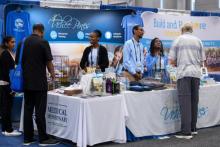Story by Royston Philbert, Adventist News Network
At the bustling exhibit hall of the 2025 General Conference Session, a serene corner offers something more than pamphlets and product samples—it offers hope, healing, and a renewed vision of wellness rooted in the Adventist message.
The Wholistic Health Experience exhibit is drawing delegates and visitors alike into a space where the Seventh-day Adventist Church’s commitment to whole-person healing takes center stage.
Whole-person care is a foundational principle of Adventist health ministry, dating back more than 150 years to the church’s earliest health-care programs. According to the AdventHealth website, it’s an approach that addresses not only a patient’s physical needs, but also their mental, emotional, and spiritual well-being.
The exhibit features leading self-supportingAdventist lifestyle and wellness ministries—Wildwood Institute, Uchee Pines Institute, and Eden Valley Institute—each showcasing the power of prevention-focused care grounded in the historic health principles pioneered by Ellen G. White. Adjacent to these is Mind Journey, sponsored by all five North American health systems. It is a collaborative health initiative that focuses on mental health as part of whole health.
“It is signaling a growing awareness of the vital connection between mental, emotional, and spiritual health,” said Anne Biggins, director of internal communications for Adventist HealthCare.
A Revival of Adventist Health Heritage
“People today are searching for something deeper—something that touches the soul, not just the symptoms,” said John Sackett, president and chief executive officer for Adventist HealthCare. “This exhibit is about reminding the world that the church has always offered a message of hope, wholeness, and healing in a trusted and intentional way.”
At the Wildwood Institute booth, directors and leaders there explained how the center has adapted traditional sanitarium-style health practices for the modern age. “We’re still using hydrotherapy, plant-based nutrition, and rest—but we’ve updated the delivery. People want practical, science-backed methods that work without compromising faith-based values,” one representative said. “What we’re seeing is that the gospel of health is just as relevant in 2025 as it was in 1866.”
Emotional Wellness Front and Center
Perhaps the most poignant addition this year is the multiple booths that offer mental health support. The booth features trained mental health professionals, church leaders, and volunteers offering resources, screenings, and workshops designed to promote emotional well-being within a spiritual framework.
“There’s no health without mental health,” said Katia Reinert, GC associate director of Adventist Health Ministries for the GC. “The stigma is real, especially in faith communities. But it’s changing. Through health programs we are helping pastors, families, and individuals understand that mental health struggles are not spiritual failures—they are human experiences that require compassion and care. Reinert noted several programs run by the church geared to supporting the mental health of individuals.
Primary among them is Remind, a new mental health program developed by the church that aims to help people with mental disorders and to provide a resource for anyone who wants to live better through a deeper understanding of the fundamental building blocks of mental health. “It is to improve the skills of pastors and educators,” Reinert noted.
Virgil Sams, a GC Session attendee from the Caribbean Union Conference, shared his experience after visiting the booth. “I visited the booth yesterday and got help, so I have returned today to say thanks and that healing is possible.”
Lifestyle Changes, Lasting Impact
At the Uchee Pines Institute booth, visitors were invited to sample herbal teas and learn about the institute’s “NEW START” approach to health, which emphasizes Nutrition, Exercise, Water, Sunshine, Temperance, Air, Rest, and Trust in God. The interactive setup highlighted simple natural remedies and lifestyle practices rooted in Adventist health principles, offering practical ways to prevent disease and promote wholistic wellness.
Nearby, Eden Valley Institute offered free health screenings and shared stories of lifestyle program graduates who reversed chronic illnesses through simple, natural interventions. “We’re not anti-medicine,” said Shanniel Fisher, president of Eden Valley. “We’re just saying that prevention is better than cure—and God gave us powerful tools in nature.”
A Spirit of Transformation
The collective message of the Wholistic Health Experience is clear: true healing encompasses body, mind, and soul—and the Adventist Church is uniquely positioned to meet that need in a world riddled with lifestyle diseases, burnout, and emotional distress.
Reinert summed it up: “Our health message is not a side ministry. It’s central to the gospel. What we’re witnessing here is a revival of that understanding, a reaffirmation that we are called to heal just as Christ did — completely.”
As visitors exit the whole health booth with hands full of literature and hearts stirred by stories of transformation, one thing becomes evident: the church’s health message is not a relic of the past. It is a living, breathing movement—one that continues to meet people where they are, offering not just information but also restoration.

